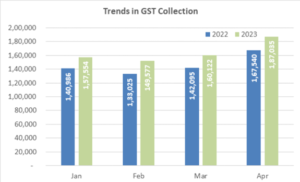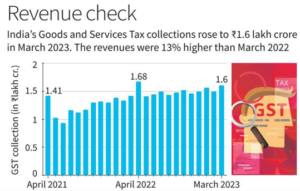16 Finance commission.
Relevance
- GS 3: Indian Economy and issues relating to Planning, Mobilization of Resources
- Tags: #GSTReform #FiscalFederalism #GSTCouncil. #IndianexpressEditorialAnalysis #UPSC #CurrentAffairs.
Why in the News?
The 122nd Constitutional Amendment of 2016, ushering in the Goods and Services Tax (GST), marked a significant transformation in India’s fiscal landscape, exploring the implications of fiscal federalism and the need for a comprehensive review by the 16th Finance Commission.
GST: Transforming India’s Fiscal Landscape
The introduction of the Goods and Services Tax (GST) regime in 2017 ushered in a system of concurrent taxation, encompassing central and state GST for every transaction.
- It granted concurrent powers of indirect taxation to both the Union and states.
- Integrated GST applies to inter-state and import transactions.
- This transition from a production-based to a consumption-based taxation system has redefined fiscal federalism, ensuring that taxes are collected where goods or services are consumed, altering both vertical and horizontal dynamics within the country.
Shifting Tax Dynamics: Challenges
Taxation Shift and Horizontal Imbalances
- Earlier, the central sales tax was an origin-based tax, shifting the tax burden from rich manufacturing states to consuming states.
- This contributed to horizontal imbalances in fiscal matters.
- The transition to the destination principle for cross-border trading ensures that poorer consuming states benefit, often at the expense of more prosperous industrialized ones.
Impact on Inter-State Supply
- The Integrated Goods and Services Tax (IGST) applied during inter-state supply have been transferred to the destination state, marking a shift from the origin to the destination principle.
Reconfiguring State Power Balance
- This shift from origin to destination principles is reshaping the balance of power among states, affecting their fiscal dynamics.
Mismatch in Fiscal Transfer System
- Despite the shift in tax principles, the federal fiscal transfer system still operates based on jurisdictional separation from the origin-based tax era, leading to a disconnect between the tax regime and sharing criteria.
- This disconnect can create fault lines in the political economy of federalism, potentially undermining the fiscal federal system.
Reforming Tax-Sharing Principles for Fiscal Federalism
The upcoming 16th Finance Commission (SFC) should be tasked with reviewing tax-sharing principles in the context of India’s changing fiscal federalism.
- Its terms of reference (TOR) should consider the integration of indirect tax authority between the Union and states.
- State governments now share their tax base with the Union, covering various taxes like excise and service tax, while the Union has expanded its reach to state-level taxes like sales tax/VAT, central sales tax, and more.
- To maintain justice and efficiency in revenue sharing, this adjustment calls for a reevaluation of fiscal principles.
Revamping Indirect Tax Sharing
- Significant shifts in the taxation system demand a re-evaluation and redesign of the statutory sharing of indirect taxes, both vertically (between the Union and states) and horizontally (among states).
- To align vertical sharing with the new system, it’s crucial to redefine the divisible pool.
- The 16th Finance Commission (SFC) should outline the process of fully incorporating IGST into the pool, including unsettled IGST with input tax credit.
- Deciding how often states receive their share of taxes is crucial to help them manage their finances better.
- These changes make tax sharing fairer and more efficient.
Efficient Collection of Taxes
- Under the new GST system, both the Union and states collect the same taxes, resulting in varying and increased collection costs, ranging from 7 to 10 percent.
- The 16th Finance Commission (SFC) should be tasked with proposing a method for calculating and sharing these collection costs more effectively.
- Additionally, the SFC can recommend ways to reduce these costs and improve the efficiency of tax collection, benefiting both the Union and the states.
- The criteria used to distribute taxes among states, particularly for equalizing grants, are based on a production-based tax system.
- These criteria must be redesigned to align with a consumption-based tax system.
Shift from Production to Consumption in Tax Distribution
- Moving from a production-based to a consumption-based system will greatly impact how tax revenues are distributed among states.
- It will also change the requirements, nature, and distribution of equalizing grants.
- This shift will result in significant changes, including a major reshuffling, because the ranking of states based on per capita income is quite different from their ranking based on per capita consumption.
Reevaluating GST Compensation Scheme
- The approach established by British Banker Otto Niemeyer in 1935, continued under Article 275, and the compensation law introduced by the GST Council should be reevaluated.
- With GST compensation grants extended until March 31, 2026, the fiscal year after that will be the base year for the 16th Finance Commission (SFC) award, operational from 2027 to 2032.
- It’s expected that states will request an extension of the compensation scheme.
- Hence, the SFC should assess the need, viability, and desirability of the compensation scheme based on GST’s revenue performance over the past six years.
- Additionally, clear guidelines should be established for allocating the remaining GST compensation cess collection to the divisible pool of taxes.
Strengthening Fiscal Oversight
- In the evolving federal finance structure, the GST Council and the Finance Commission should establish a formal institutional relationship.
- The 16th Finance Commission should explore how the GST Council can serve as a Fiscal Council to oversee the implementation of its award during periods when the Commission is not active.
The 16th Finance Commission must embrace fresh thinking conceptually, methodologically, and operationally. Its Terms of Reference should encourage and guide this transformative direction.
Source: Indian Express
Mains Question
Analyze the impact of the GST on the federal structure of India, particularly in terms of revenue distribution among states. How has the destination principle in GST affected the balance of power among states?





